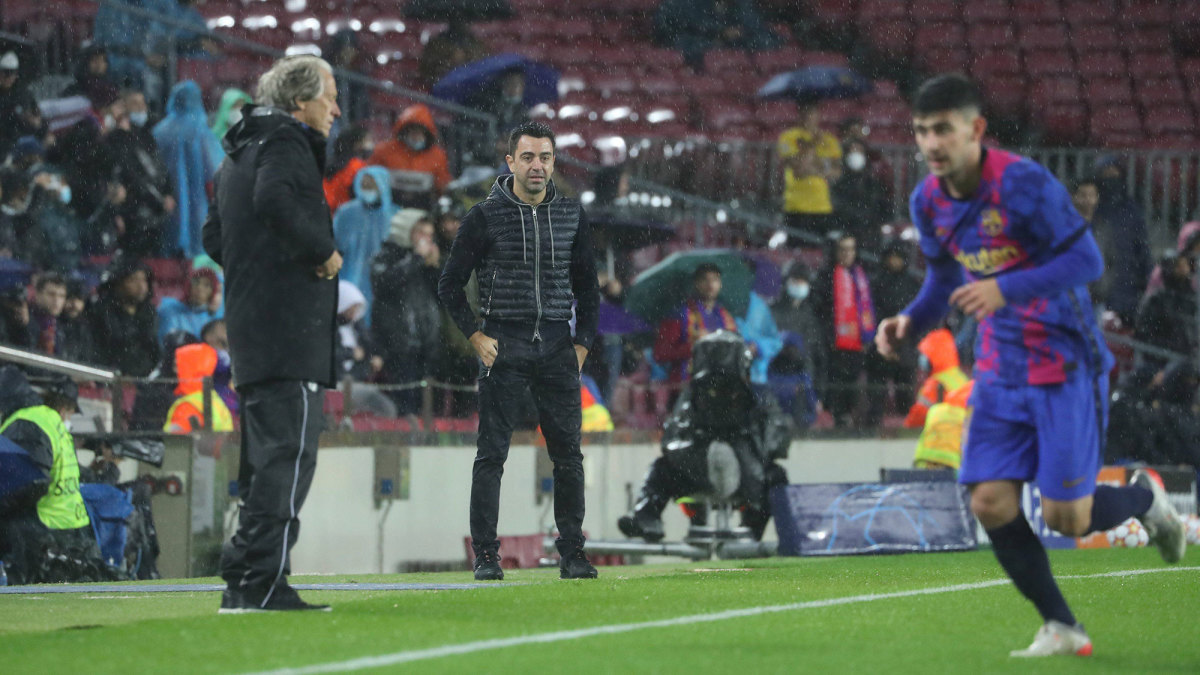Xavi's Storybook Barcelona Return Doesn't Mean an Instant Turnaround
A goalless draw between Barcelona and Benfica means that both sides keep alive their hopes of taking second place in their Champions League group behind Bayern Munich. But Tuesday’s meeting at the Camp Nou wasn’t really about that. This was about the return of a hero, Xavi’s first UEFA Champions League game as a manager and the continuation of his first steps on a very long road to restoring Barcelona’s status at the top of European football.
Xavi’s appointment as successor to Ronald Koeman had prompted a surge of enthusiasm, with more than 70,000 turning out on Saturday for the 1-0 win over Espanyol. Torrential rain, rather than a slightly scratchy performance in the derby, meant there was a dip again down to 49,000, but the mood was far more positive than it had been in the declining weeks of Koeman's reign. Quite apart from anything else, Xavi offers the sense that Barcelona has gone back to its true essence.
Since the early 1970s, when Rinus Michels became coach and Johan Cruyff joined him as a player, Barcelona has been a Catalan outpost of Total Football. Cruyff restored the faith when he came in as coach in 1988, since when it had been propagated through the academy, La Masia, and his disciples. Pep Guardiola was a La Masia product who became Cruyff’s puppetmaster on the pitch, and Xavi, another La Masia graduate, performed a similar function for Guardiola.
Xavi has always been evangelical for that Cruyffian style. He speaks of playing football the right way as though it is a battle for the soul of the sport, and in that regard he was always the perfect candidate for Joan Laporta’s program of renewal after he returned to the Barcelona presidency. Barcelona is a strange club in that regard: being of the right philosophical school often seems to matter more than practical experience. Frank Rijkaard led the club to its second Champions League title, but he was a disappointment in every other management job he took on.
But style isn’t everything, however it may have underpinned the successes of the Rijkaard and Guardiola years. There are two major causes for concern. The first is that football has changed over the past decade. Structures of pressing have become more sophisticated, and teams have learned how to deal with sides capable of holding possession for long spells. The same blueprint that worked for Guardiola at Barcelona cannot simply be rolled out again now. And that is especially true given that this squad, for all its bright young players, is nowhere near as good as the side Guardiola inherited, nor are their funds available to strengthen it.
And then there is the more specific issue of Xavi. There is a danger always with fundamentalists that they can recite the philosophy without being able to enact it. Just because Xavi was a brilliant and intelligent player does not necessarily mean he will be so as a manager. Can he instill that style in others? Can he make tweaks and changes to adapt to changing circumstances and opponents? Perhaps he can, perhaps he can’t, but winning the league and cup in Qatar with Al-Sadd offers only flimsy evidence given the advantage of resources that club enjoys and the relative standard of football. That Xavi played with three of Barcelona’s first-team regulars only complicates the picture further.
On Tuesday, Barcelona started brightly and there were moments when a sympathetic mind might have seen evidence of Xavi’s influence. It did play high up the pitch out of a 3-4-3, the wingers stayed wide and there were neat little triangles. But then Benfica was sitting off and perhaps that would have happened anyway. Barcelona was neat enough, but lacked cutting edge, too often misplacing the final pass. Memphis Depay’s reluctance to shoot with his left foot perhaps led to a couple of opportunities that were squandered.
Gradually the game sank into a tetchy midfield battle and Benfica offered an increasing threat on the break, particularly after Darwin Núñez came on. The introduction of Ousmane Dembélé from the bench gave Barcelona new impetus on the right, but Benfica held out and would have won had Haris Seferovic not somehow stabbed wide having taken the ball beyond goalkeeper Marc-Andre ter Stegen in injury time.
Barcelona still leads Benfica by two points and goes to Bayern Munich, which is already through as the group winner, in two weeks for the final matchday, while Benfica is at home to Dynamo Kiev, which is already out of contention for even a third-place finish and a spot in the Europa League knockout phase. Critically, perhaps, Benfica has the better head-to-head record. Barcelona could be facing an extreme rarity: a failure to reach the knockout stage and the humbling act of tumbling into the Europa League's last 32. But Xavi’s appointment was never really about this season’s Champions League. It’s a much longer-term project than that.
More Soccer Coverage:






